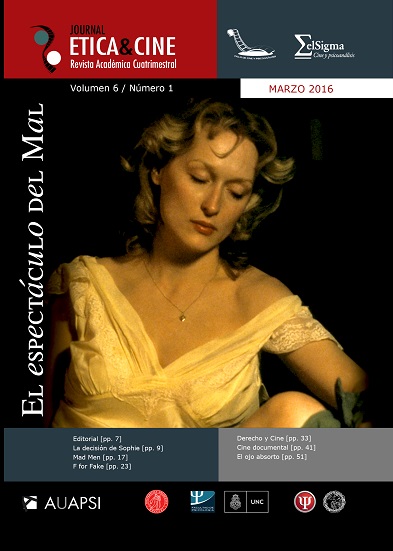Is it possible an ethical decision in the concentration camp? About Sophie’s choice
DOI:
https://doi.org/10.31056/2250.5415.v6.n1.14856Keywords:
Sophie's Choice, Giorgio Agamben, Ethical dilemmas, Nazism, Concentration campsAbstract
The unsettling figure of concentration camps has motivated the intellect and the imagination of academics and artists of all kinds, who have tried to understand the structure of those settings, and the human dynamics they foster.Philosopher Giorgio Agamben has sought this understanding based on his theorization of the state of exception, which allows the sovereign (the State) to suspend the rule of law, so as to facilitatean extrajudicial way of acting,this being nonetheless validated by the power the State is entitled to exert. In concentration camps exceptionality is a constant factor, which encourages certain social forms and behaviours that overstep what would be the “usual” forms and ways of acting. The film Sophie’s Choice by Alan Pakula, alike the novel by the same name it is based on, presents us with a scenario that has been interpreted as a matter of decision-making when faced with an ethical dilemma (choosing between life and death regarding the main character’s own children) in Auschwitz-Birkenau concentration camps.In view of all the analyses that try to explain the issuesthat stem from ethical dilemmas, this paper, following the agambenean theory, argues that there is no such thing as ethical decision-making in concentration camps, given that the traditional legal order has been suspended, moral discernment has been blocked, and hence what does appearis behaviour that simply adapts itselfto the exceptional circumstances that prevail.References
Agamben, G. (2006). La comunidad que viene. Trad. José Luis Villacañas, Claudio La Rocca y Ester Quirós. Valencia: Pre-Textos.
Agamben, G. (2010). Medios sin fin. Notas sobre política. Trad. Antonio Gimeno Cuspinera. Valencia: Pre-Textos.
Dovi, S. L. (2006). Sophie’s choice: letting chance decide. Philosophy and Literature, 30(1), 174-189.
Esposito, R. (2006). Bíos. Biopolítica y filosofía. Trad. Carlo R. MolinariMarotto. Buenos Aires: Amorrortu.
Pakula, A. (productor y director) (1982). Sophie’schoice [cinta cinematográfica]. EE.UU.: Universal Pictures.
Styron, W. (1980). Sophie. Trad. Antoni Pigrau. Barcelona: Grijalbo.
Tendlarz, S. E. (2013). Shoa. Ética y Cine Journal, 3(2), 83-88.
Downloads
Published
Issue
Section
License
Los autores que publiquen en Ética y Cine Journal aceptan las siguientes condiciones:
Los autores/as conservan los derechos de autor © y permiten la publicación a Ética y Cine Journal, bajo licencia CC BY-SA / Reconocimiento - Reconocimiento-CompartirIgual 4.0 Internacional. La adopción de esta licencia permite copiar, redistribuir, comunicar públicamente la obra, reconociendo los créditos de la misma, y construir sobre el material publicado, debiendo otorgar el crédito apropiado a través de un enlace a la licencia e indicando si se realizaron cambios.

Este obra está bajo una licencia de Creative Commons Reconocimiento-CompartirIgual 4.0 Internacional.




